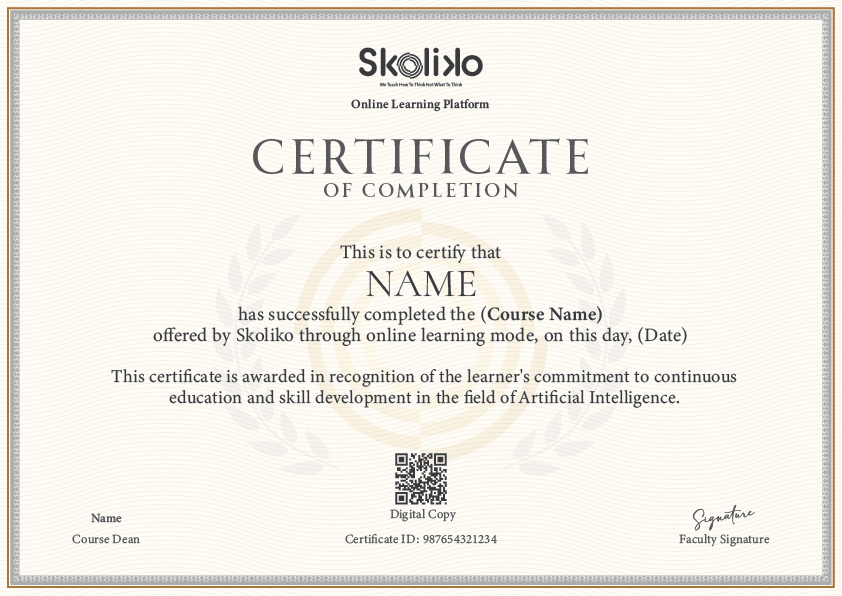
GET CERTIFICATE | GET PLACEMENT IN TOP COMPANIES
Upon successful completion of this course and all assessments, you'll earn a valuable certificate. This credential formally validates your newly acquired skills and knowledge, serving as a tangible testament to your dedication and achievement in this field.
SKOLIKO is an innovative leader in the education industry, committed to bridging the divide between academic and professional spheres.
Embrace change, pursue growth
relentlessly, and let your passion drive
| Course Overview
This course offers a comprehensive introduction to AI-powered astronomy, guiding students through essential concepts of machine learning, deep learning, and data analysis within the context of astronomy. Learners will gain practical experience in image processing, handling astronomical datasets, and applying advanced Python techniques. By the end of the course, students will be able to classify galaxies using real-world data, thanks to their mastery of FITS files, OpenCV, and neural network models. Whether exploring star classification or analyzing galaxy structures, this course empowers students to combine AI with astronomy for meaningful data-driven insights.
| Why Choose SKOLIKO?
Beyond technical skills, we focus on your career growth. Our blend of practical training, mentorship, and industry connections ensures you stand out in the competitive field of Astronomy.
| Industry Relevance & Job Opportunities
AI applications in astronomy are booming, supported by massive datasets from observatories and satellites. Skills gained here are highly transferable to roles in:
- Astroinformatics
- Space Data Science
- AI/ML Engineer roles in R&D labs
- AI Research Assistant
- Academic careers with strong research backgrounds
Completion of this course gives you an edge in applying for international PhD fellowships and research positions in top universities. With hands-on projects, your profile will shine in competitive admissions.
| Who Is This Course For?
This course is perfect for anyone curious about the universe and passionate about using technology to explore it. Whether you’re a beginner, student, or working professional, this course opens a new dimension of learning and discovery.
- Aspiring Researchers & Students
- Tech Enthusiasts & Developers
- Astronomy Lovers & Space Enthusiasts
- Career Changers & Early Professionals
- Anyone With:
- A love for stargazing, space exploration, or scientific discovery.
- A strong desire to learn new technologies like ML, neural networks, and image processing.
- A dream to publish in international conferences and contribute to global space research.
| Next Steps After This Course
Pathway: What You Gain
- Higher Education: Eligibility & strength for PhD applications abroad
- Employment: AI-Astronomy portfolio = job-ready
- Research: Co-authorship on published papers and international exposure
- Internships: Explore advanced research problems via SKOLIKO’s portal
0. About the Course

1. Introduction to Image Processing (Theory)

2. Introduction to Astronomy at Large (Theory and Hands-on)

3. Basics of python, Data Types (Hands-on)

4. Advanced Python (Functions and Loops) (Hands-on)

5. Numpy (Hands-on)

6. Matplotlib and Image Processing with OpenCv (Hands-on)

7. Introduction to Image Processing (Hands-on)

8. Image Convolution & Gaussian Denoising (Hands-on)

9. Pixel Scaling and Normalization (Hands-on)

10. Feature Detection and Extraction (Hands-on)

11. Astronomical data analysis (FITS Intro) (Hands-on)

12. Astronomical data analysis on NGC3184 (Hands-on)

13. Searching for Black Hole (Hands-on)

14. Galsim for generating galaxy Images – Project-1(Part-1)

15. Galsim Image generation and Processing- Project-1(Part-2)

16. Intro to Machine Learning (Theory)

17. Intro to Machine Learning (Hands-on)

18. Star Type detection using Machine Learning - Project-2(Hands-on)

19. Intro to Deep Learning - Neural Networks (Theory)

20. Intro to Convolutional NN (Theory)

21. Implementation of NN (Hands-on)

22. Deconvolution of Galaxy Images Project-3(Part-1)

23. Result Analysis of Deconvolution Project-3(Part-2)

24. Project 4 - Galaxy Zoo (Hands-on) – Part 1

25. Project 4 - Galaxy Zoo (Hands-on) – Part 2

26. Build a new Model

Course duration - 25 Hours
|Course day - every week "Saturday"
|Course time - 04:00pm to 07:30pm
Instructor

Vishnu Vasudev
Research Fellow in Astrophysics at the prestigious College of Engineering
Vishnu Vasudev embodies a fascinating journey - an M.Tech. in Electronics and a UGCNET scholar who evolved from a project engineer and dedicated assistant professor to become a Research Fellow in Astrophysics at the prestigious College of Engineering, Chengannur. Beyond academia, he's a celebrated YouTuber, author of two enlightening books on Astrophysics, and a distinguished Abdul Kalam Doctoral Fellow. His multifaceted expertise and passion illuminate both the scientific and educational realms.











